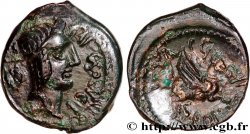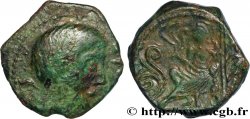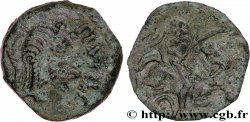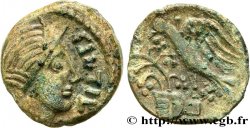v50_0104 - GALLIA - CARNUTES (Regione della Beauce) Statère d’électrum à la joue ornée et à la lyre
MONNAIES 50 (2011)
Начальная цена : 4 500.00 €
Назначить цену : 7 500.00 €
Цена реализации : 4 500.00 €
Количество ставок : 1
Максимальная предлагаемая цена : 4 500.00 €
Начальная цена : 4 500.00 €
Назначить цену : 7 500.00 €
Цена реализации : 4 500.00 €
Количество ставок : 1
Максимальная предлагаемая цена : 4 500.00 €
Тип Statère d’électrum à la joue ornée et à la lyre
Дата: Ier siècle avant J.-C.
Монетный двор / Город: Chartres (28)
Металл: electrum
Диаметр: 21 mm
Ориентация осей монеты: 10 h.
Вес: 7,07 g.
Редкость: R3
Комментарии о состоянии
Monnaie d’un type exceptionnel, frappée sur un flan relativement large et irrégulier, de très bas aloi. Le type de droit est incomplet au niveau de la chevelure, mais néanmoins idéalement centré avec une superbe représentation. Le revers est de frappe vigoureuse, mais avec une faiblesse de frappe périphérique, probablement due à l’utilisation d’un coin très convexe. Très agréable patine sur un métal rose orangé
Ссылки в каталоге: :
Происхождение:
Cet exemplaire provient d’une importante collection normande
Лицевая сторона
Аверс: легенда: ANÉPIGRAPHE.
Аверс: описание: Tête laurée imitée de Philippe II, très stylisée avec la tête luniforme et l'œil en amande, à droite ; l’oreille ornée d’une boucle à trois brins ; chevelure en mèches complexes.
Обратная сторона
Реверс: легенда: ANÉPIGRAPHE.
Реверс: Описание: Bige à droite conduit par un aurige ; la roue du char sous la queue des chevaux et une lyre renversée entre leurs jambes.
Комментарий
Pour cette série de statères à la lyre, plusieurs classes ont été distinguées. Cet exemplaire correspond à la classe III au profil luniforme et à la joue lisse. Cet exemplaire est d’ailleurs largement plus beau et complet que tous ceux qui illustrent le Nouvel Atlas.
Les quarts de cette série sont presque l’exacte réduction modulaire du statère, mais avec un cheval à la place du bige au revers. Le style du droit et du revers, ainsi que le type de métal utilisé, rapprochent ces monnaies du statère épigraphe KABALLOS CONTI.
Les monnaies anépigraphes de cette série qui sont reprises dans le Nouvel Atlas, dans le Moneta ou encore par D. Nash sont toutes de mauvais style alors que cet exemplaire est d’un style exceptionnel et d’une très bonne gravure !.
Les quarts de cette série sont presque l’exacte réduction modulaire du statère, mais avec un cheval à la place du bige au revers. Le style du droit et du revers, ainsi que le type de métal utilisé, rapprochent ces monnaies du statère épigraphe KABALLOS CONTI.
Les monnaies anépigraphes de cette série qui sont reprises dans le Nouvel Atlas, dans le Moneta ou encore par D. Nash sont toutes de mauvais style alors que cet exemplaire est d’un style exceptionnel et d’une très bonne gravure !.








 Cообщить об ошибке
Cообщить об ошибке Распечатать страницу
Распечатать страницу Отправить мой выбор
Отправить мой выбор Задать вопрос
Задать вопрос Consign / sell
Consign / sell
 Информация
Информация









